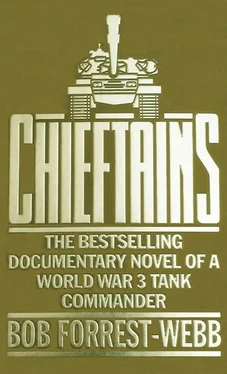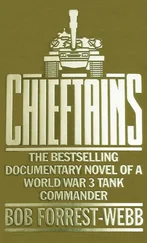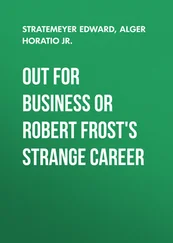Browning stood up. There was nothing more to be done; it was all over. He raised his hands, saw that the Russians had stopped and were watching him in the light of the flames, and felt a strange sense of relief. He took a step forward, and as he did so the infantrymen began firing. Will Browning’s second war had lasted his lifetime.
Second Lieutenant Robin Sache-Worrel was feeling very uncertain of a situation which had developed in the stay-behind unit ‘Magpie’. For the past three and a half hours he had been sitting in the fighting compartment of his Scimitar questioning his own memory, He had been standing near Captain Fellows when the orders had come through from headquarters. He heard Fellows repeat the radio message. ‘Apex Crown Echo… Trophy Bacon Sunset Juliet area.’
Then the captain had translated for Lieutenant Hinton: ‘Wizard had given us one K west of Hehlingen as the location of the Soviet Divisional HQ.’
Things had happened so quickly after the unit received its orders that Sache-Worrel gave them no more thought until the SAS had left to reconnoitre the area and determine the exact situation of the enemy headquarters the stay-behind-unit were to attack. Sache-Worrel’s mind had been keyed up by the thought of the coming action. He had no experience of death or pain in war, and there had been no sense of fear to dull his anticipation. He knew its dangers only secondhand.
His present uncertainty had nothing to do with his own future in a physical sense. It had arisen during the waiting period, when the adrenalin level had eventually dropped and his thoughts became more reasoned. Captain Fellows’ translation of ‘Trophy Bacon Sunset Juliet area’, had been incorrect.
‘Bacon’ was not Hehlingen; Sache-Worrel was certain it was Bisdorf.
He had run through the day’s codes a hundred times in his head. The more he did so the more positive he became that the code-name for the town of Hehlingen was ‘Brandy’; ‘Bacon’ as Bisdorf was a full ten kilometers further south.
Sache-Worrel was very aware he was the most junior of the Scimitar commanders in the stay-behind unit. It was unusual for all commanders, within what was virtually a troop, to be commissioned. But it had been thought by HQ that, with a high casualty probability, this would enable the unit to continue to function regardless of losses. Sache-Worrel was only a second lieutenant, and above him in rank were two first lieutenants, Roxforth and Gunion, and then Captain Fellows.
If a mistake had been made by the captain, Sache-Worrel thought, then surely one of the others must have noticed as well as himself. As a junior officer, he could hardly accuse his unit commander of something which amounted to at least carelessness, perhaps worse in wartime.
He had now begun to doubt his own memory. Perhaps he had learnt the codes incorrectly… perhaps he had misheard the message. It wasn’t doing much to help his self-confidence. What would happen if he made similar errors in battle? Mistakes were even more possible in the clamour and confusion! Supposing he forgot something vital? This was no longer a training exercise… he might write off his whole crew as well as himself… perhaps jeopardize the entire scheme.
But if Captain Fellows had made the mistake, then everything was a cock-up anyway.
He had known Captain Fellows almost a year, though it had only been during the past three months that he had served under him in the unit. Fellows was normally pleasant enough, finicky perhaps; the captain didn’t have to rely on his service pay for his cash, he had a good private income which allowed him to run a couple of polo ponies and live extremely well, but that was his good luck. He seemed to have few friends in the regiment, but talked as though he had plenty outside. In fact it was generally agreed amongst the younger officers that Fellows was really waiting for dead-men’s boots, his father’s, and the estates in Bedfordshire that went with them. But Sache-Worrel had never heard the captain criticized for any lack of ability as an officer, only for his obsession with tidiness.
‘Bacon’ is Bisdorf! It was there in his mind again, nagging like a persistent fishwife.
Silently he pushed himself out of the Scimitar’s hatch. Captain Fellows had suggested rather than ordered them to stay with their vehicles, but nevertheless Sache-Worrel felt guilty as he jumped from the hull, and almost expected to hear the captain’s voice question him.
Gunion’s Scimitar was the closest, thirty meters away to his right at the easternmost corner of the square formed by the four tanks. The two SAS APCs were concealed within the square. Somewhere in the darkness of the woods beyond the tanks were the SAS guards Hinton had posted before leaving with his patrol; they gave Sache-Worrel the same feeling of safety his father had spoken of when discussing the operational value of Gurkha riflemen in the Second World War.
Sache-Worrel’s background sometimes inhibited him. It did so now as he stood below Gunion’s turret. He felt he should knock rather than simply trespass on his neighbour’s territory by clambering uninvited on to the hull. He tried a discreet cough, but although Gunion’s turret hatch was open, no one appeared. After a moment’s hesitation, he pulled himself on board.
‘Ben?’ The interior of the Scimitar was a black pit, but Sache-Worrel could smell the usual combination of oil and sweat. ‘Ben? He was keeping his voice low, confidential. He was about to reach down into the darkness when Ben Gunion’s face appeared very close to his own, like a surprised jack-in-the-box.
‘Good God!’
‘It’s me… Robin…’
‘Damn you, Robin, I almost pissed myself. What on earth are you creeping about for?’
‘I was thinking…’
‘For God’s sake don’t think,’ advised Gunion. ‘It’s contagious. Want a quick snort? Here…’ He handed Sache-Worrel a quarter litre flask of Asbach. ‘I’ve got a decent bottle of claret in my locker, but it’s probably too shaken about. Wasn’t going to leave it for the bloody Ruskies, though. Well, drink up…’
‘No thanks, Ben.’ Sache-Worrel passed him back the liquor.
‘You sound ill. Nervous?’ Gunion was ‘sympathetic. He liked Sache-Worrel. ‘Don’t be. It won’t be as bad as you think. Pre-match nerves — they’ll disappear as soon as the balloon goes up.’ Sache-Worrel was the same age as Gunion’s younger brother, and always made the first lieutenant feel protective. ‘We’ll give them hell. Just remember the training; keep your head down and whenever possible attack the command vehicles. In and out fast, before they’ve a chance to recover.’
‘It’s not nerves, Ben. It’s just… well, something else.’
‘Girls? I say, you haven’t got yourself into a spot of bother! Now that would be a fine thing.’
‘No, it’s not a girl… it’s to do with Captain Fellows.’
‘Well, spit it out.’
Sache-Worrel told him. Gunion took another sip of his schnapps before he made any comment, then he said: ‘I didn’t hear the message. Bugger! You’re certain you’ve got it right? Bacon is the correct code for Bisdorf, but was Bacon the word in the message? Are you sure you heard Bacon and not Brandy?’
‘I was positive; now I’m not so certain. That’s the trouble. I’ve been thinking about it so much I’ve confused myself. An hour ago I’d have staked my life I was right, now I don’t know.’
‘We could all be staking our lives on it’
‘What can we do?’
‘You, nothing! It’s Sandy’s job as senior lieutenant. God! I wondered why we hadn’t seen anything of Hinton’s lot, they’re probably chasing halfway around the Hassenwinkel on a wild goose chase. They were due in an hour ago, and working with the SAS is like working with robots; they usually programme themselves to the second.’
Читать дальше












